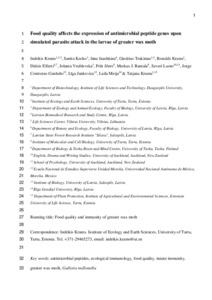Food quality affects the expression of antimicrobial peptide genes upon simulated parasite attack in the larvae of greater wax moth
Indrikis Krams; Sanita Kecko; Inna Inashkina; Giedrius Trakimas; Ronalds Krams; Didzis Elferts; Jolanta Vrublevska; Priit Joers; Markus J. Rantala; Severi Luoto; Jorge Contreras-Garduno; Liga Jankevica; Laila Meija; Tatjana Krama
Food quality affects the expression of antimicrobial peptide genes upon simulated parasite attack in the larvae of greater wax moth
Indrikis Krams
Sanita Kecko
Inna Inashkina
Giedrius Trakimas
Ronalds Krams
Didzis Elferts
Jolanta Vrublevska
Priit Joers
Markus J. Rantala
Severi Luoto
Jorge Contreras-Garduno
Liga Jankevica
Laila Meija
Tatjana Krama
WILEY
Julkaisun pysyvä osoite on:
https://urn.fi/URN:NBN:fi-fe2021042718240
https://urn.fi/URN:NBN:fi-fe2021042718240
Tiivistelmä
Predator-prey interactions are an important evolutionary force affecting the immunity of the prey. Parasitoids and mites pierce the cuticle of their prey, which respond by activating their immune system against predatory attacks. Immunity is a costly function for the organism, as it often competes with other life-history traits for limited nutrients. We tested whether the expression of antimicrobial peptides (AMP) of the larvae of the greater wax moth Galleria mellonella (L.) (Lepidoptera: Pyralidae) changes as a consequence of insertion of a nylon monofilament, which acts like a synthetic parasite. The treatment was done for larvae grown on a high-quality vs. a low-quality diet. The expression of Gloverin and 6-tox were upregulated in response to the insertion of the nylon monofilament. The expression of 6-tox, Cecropin-D, and Gallerimycin were significantly higher in the low-quality diet' group than in the high-quality diet' group. As food quality seems to affect AMP gene expression in G. mellonella larvae, it should always be controlled for in studies on bacterial and fungal infections in G. mellonella.
Kokoelmat
- Rinnakkaistallenteet [29337]
